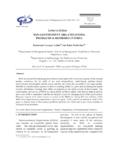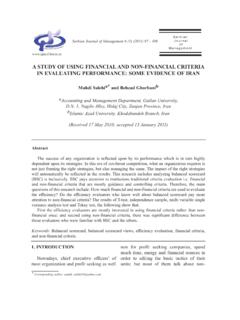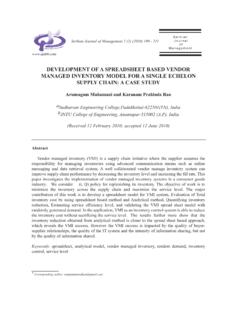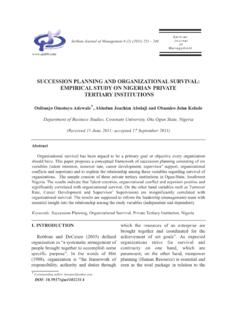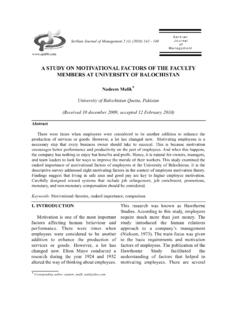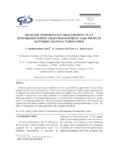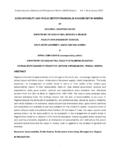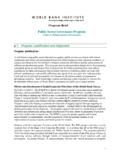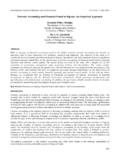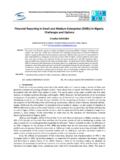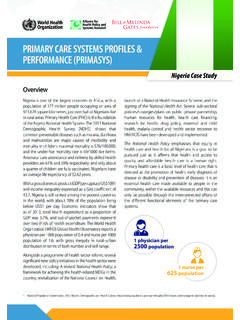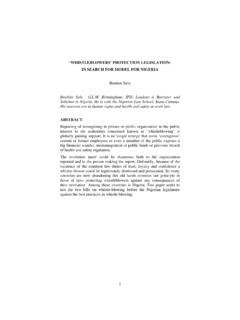Transcription of POOR CORPORATE GOVERNANCE AND ITS …
1 1. INTRODUCTIONThe anxiety over the current bankingsector crisis in nigeria is understandablegiven the vital role played by the bankingsector in the economic development of anynation. The banking industry plays a majorintermediation role in an economy bymobilizing savings from surplus units andchanneling these funds to the deficit unitsparticularly the private enterprises for thepurpose of expanding their productionPOOR CORPORATE GOVERNANCE AND ITS CONSEQUENCESON THE NIGERIAN BANKING SECTORBen Emukufia Akpoyomare Oghojafora, Olufemi Olabode Olayemia*, PatrickSunday Okonjiaand James Ugochukwu OkoliebaDepartment of Business Administration, Faculty of Business Administration, University of Lagos, Akoka -Yaba , Lagos State, nigeria - West Africa bDepartment of Accounting & Finance, Faculty of Management Sciences.
2 Lagos State University, Ojo- Lagos State, nigeria - West Africa (Received 5 September 2009; accepted 23 July 2010)AbstractThe anxiety over the current banking crisis in nigeria is understandable. This is borne out of thefact that the economic development of any country is directly tied to its banking sector . Theeffectiveness and efficiency with which the banks perform their intermediary roles between thesurplus and deficit spending units of the economy determines to a very large extent the prosperity ofany nation. CORPORATE GOVERNANCE is systematic and formalized manners of ensuring that topmanagement represented by the board of directors do not make decision making powers occasionedby management and ownership separation to pursue personal interests at the expense of otherstakeholders.
3 This study made use of structured questionnaire to elicit responses from convenientlyselected respondents comprising of investment experts, academics, banks customers, public andpolicy analysts with in Lagos metropolis. It was hypothesized and the study confirmed that poorgovernance culture and supervisory laxities were majorly responsible for the current banking study recommended an adherence to the execution of the tenets of good CORPORATE governancein Nigerian banking sector and actions contrary to this should be dealt with appropriately by bringingoffenders to book irrespective of their status in the words: CORPORATE GOVERNANCE , ownership separation, banking crises, effectiveness, efficiency,economic development*Corresponding author.
4 Journalof ManagementSerbian Journal of Management 5 (2) (2010) 243 - 250 The concern over corporategovernance stems from the fact that soundgovernance practices by organizations,banks inclusive results in higher firm smarket value, lower cost of funds and higherprofitability (Block, Jang & Kim, 2006 &Claessen, 2006).Eight chief executives and executivedirectors of some Nigerian banks weresummarily dismissed between August andOctober, 2009 due to issues related to poorcorporate GOVERNANCE practices. This wassequel to the conclusion of auditinvestigations embarked upon by the centralBank of nigeria to determine the soundnessof Nigerian banks.
5 The release of thesereports led CBN to conclude that the affectedbanks have acted in manners detrimental tothe interest of depositors and creditors. Thiswas at variance to the clean bill of goodhealth earlier given to these banks byregulatory authorities (CBN inclusive) andtheir so called appointed reputable contradictions and the resultant lossin wealth and investor s confidence havenecessitated this inquiry and therefore thisstudy, hopes to achieve the followingspecific objectives:1. to determine the extent to which non-compliance with CORPORATE GOVERNANCE codesby the bank executives contributed to thispresent crisis2.
6 To ascertain the extent of theregulatory authorities complicity and laxityin the present to the crises3. to examine and evaluate the role ofpersonal greed of executives in fostering thiscrises and 4. to proffer possible solutions toresolve the crises and prevent futurereoccurrenceBased on the objectives and the focus ofthis study the hypotheses formulated were:H1: poor CORPORATE GOVERNANCE cultureprecipitated the current Nigerian bankingsector :Supervisory laxity has significantlycontributed to the current Nigerian bankingsector THEORETICAL FRAMEWORKThe topicality of CORPORATE governancehas manifested in diverse definitionsdepending on the interests and individualsinvolved.
7 Cadbury (2000) defined corporategovernance as being concerned with holdingthe balance between economic and socialgoals and between individual and communalgoals. The CORPORATE GOVERNANCE frameworkis there to encourage the efficient use ofresources and equally to requireaccountability for the stewardship of thoseresources. The aim is to align as nearly aspossible the interests of individuals corporations and society. Similar finding isexpressed by Orham and Yildirim (2009).OECD (1999) posits that corporategovernance is the system by which businessare directed and controlled. The corporategovernance structures specifies thedistribution of rights and responsibilitiesamong different participants in thecorporation such as the board, managers,shareholders and other stakeholders and spellout the rules and procedures for makingdecisions on CORPORATE affairs by doing this,it also provides the structure through whichthe company objectives are set and themeans of attaining these objectives andmonitoring performance.
8 Corporategovernance is concerned with the intrinsicnature, purpose, integrity and identity of theinstitution with a primary focus on / SJM 5 (2) (2010) 243 - 250entity s relevance continuity and judiciaryaspect. GOVERNANCE involves monitoring andoverseeing strategic direction, socio-economic and cultural content externalitiesand constituencies of the to Imala (2002) and Srivastava(2010) from the perspective of the bankingsector, CORPORATE GOVERNANCE involves themanner in which the business and affairs ofindividual institutions are governed by theirboard of directors and senior managementwith depositors standing out clearly as themost important essential feature of a corporation is theseparation of ownership from this end, the shareholders (owners)delegate decision making rights to managersto act on their behalf.
9 However, thisseparation of ownership from control impliesa loss of effective control by shareholdersover managerial decisions. Thus, the primaryobjective of CORPORATE GOVERNANCE is toattempt an alignment of the managerialincentives with those of stakeholders. This isto check the tendency of selfishness bymanagerial employees especially the topones to ensure that delegated decisionsmaking powers are not abused to thedetriment of shareholders and major elements of corporategovernance are good board practices, controlenvironment, transparent disclosure, welldefined shareholder rights and boardcommitment. The four pillars of corporategovernance are accountability, fairness,transparency and independency (Omeiza-Micheal, 2009).
10 Weil et al (2002) concludedthat although, CORPORATE GOVERNANCE can bedefined in a variety of ways, generally, itinvolves the mechanisms by which abusiness enterprise organized in a limitedcorporate form is directed and controlled. Itusually concerns mechanisms by whichcorporate managers are held accountable forcorporate conduct and codes have been developed as aguide to CORPORATE GOVERNANCE ; however, thebest guide to global CORPORATE governancewas developed by the OECD. The OECD(1999) principle of CORPORATE GOVERNANCE isas shown below; rights of shareholders: thecorporate GOVERNANCE framework shouldprotect shareholders equitable treatment ofshareholders: the CORPORATE governanceframework should ensure the equitabletreatment of all shareholders includingminority and foreign shareholders.

